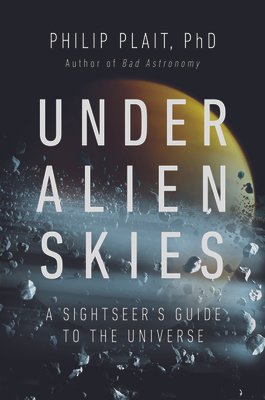The Best Books of 2023: Science!
/As in other recent years, 2023 made the whole concept of 'best science' books seem parlous to the point of absurdity. How to talk about the best science books – or science books at all – at a moment in history when 30% of the adult population of the US thinks it's “possible” that the Earth is flat? When 60% of the same adult population thinks it's “possible” that vaccines cause autism? When roughly 50% of that same population, when asked, is unclear whether the Earth revolves around the Sun or the other way around? In such a moment of history, is there a meaningful difference between “best science” and “best science fiction”? Well, we can only hope that if there's one place such a difference still obtains, it's among readers! These were the best popular science books of 2023:
10 Once Upon a Prime: The Wondrous Connections Between Mathematics and Literature by Sarah Hart (Flatiron Books)
We kick off our science list still clinging to the safe harbor of literature with this strange and utterly wonderful nonfiction debut in which Hart playfully teases out all kinds of nerdish mathematical secret readings of great works of literature. This isn't a new gimmick, of course, but here it's done with such energy and genuine insight that I almost bought it all.
9 Under Alien Skies: A Sightseer’s Guide to the Universe by Philip Plait (WW Norton)
The chatty, breezy tone of this pop-astronomy book initially prompted me to consider it a brainless little thing of the type that crops up at least a couple of times every year. But although Plait is indeed trying too hard to tickle his readers, he's also conveying a great deal of fascinating information in very colorful ways.
8 From One Cell: A Journey into Life's Origins and the Future of Medicine by Ben Stanger (WW Norton)
Through sheer narrative energy, Stanger takes the most basic realities of biology – cytology – and transforms it into a thrilling story of exploration, adaptation, and innovation. There's a good deal of speculation about the ways modern biological science can adapt and maybe improve those functions, but the main attraction is the wonder of what we already know.
7 Homo Sapiens Rediscovered: The Scientific Revolution Rewriting Our Origins by Paul Pettit (Thames & Hudson)
A few of the titles on the list this time around engage in the time-honored practice of taking a sweep of the latest research on some scientific subject and synthesizing it for general-interest readers, and this surprisingly gripping book by Pettit does this for the current study of the deep pre-history of the human race.
6 The Parrot and the Igloo: Climate and the Science of Denial by David Lipsky (WW Norton)
The main attraction of Lipsky's latest book is his antic, energetic, always readable prose, which makes the whole thing a delight to read. Far less delightful is the book's underlying subject matters, which are both catastrophic climate change and the almost insane widespread public resistance to staring that catastrophe in the face.
5 At Work in the Ruins (with endless subtitle) by Douglas Hine (Chelsea Green Publishing)
The more consideration you give Hine's book, which on the surface is about the conceptual after-effects of going through the worst of the COVID-19 pandemic, the deeper and stranger the book reveals itself to be. These are the intensely personal reflections about societal responses to large catastrophes like the pandemic or climate change.
4 Putting Ourselves Back in the Equation (endless subtitle) by George Musser (Farrar, Straus and Giroux)
A couple of books on the list this time around are here after deep reconsideration and possibly a bit of ironizing. Musser, author of the excellent Spooky Action at a Distance, here casts a wide net, looking at current research in fields like AI and human cognition – and toying with the oh-so-scientific idea that humans really ARE the center of literally everything.
3 How We Age: The Science of Longevity by Colleen T. Murphy (Princeton University Press)
This overview of some recent research on the perennial subject of human longevity is wonderfully paced and narrated, and it often verges on what reads like science fiction, with scientists constantly pushing the boundaries of what we know about how cells run down – and how they might be convinced not to.
2 The Possibility of Life (endless subtitle) by Jaime Green (Hanover Square Press)
In omnivorously curious and often exultant prose, Green here draws on recent science in order to rehash the age-old question of whether or not life exists anywhere else in the universe. Couching his observations in the staggering number of galaxies and stars, Green naturally positions himself as a true believer, and he very nearly convinces.
1 The Science of Reading: Information, Media, and Mind in Modern America by Adrian Johns (University of Chicago Press)
We end the list as we began, by returning to the intersection of science and reading. The best science title of 2023 is an incredibly in-depth examination of what we all do when we read – what our eyes do, what our brains do, what our memory does as we're turning pages and creating mental versions of the things we're reading. This is difficult matter to transform into, maybe ironically, good reading, and Johns succeeds completely.










